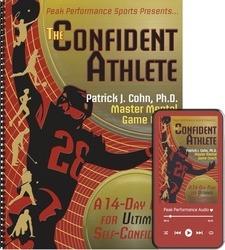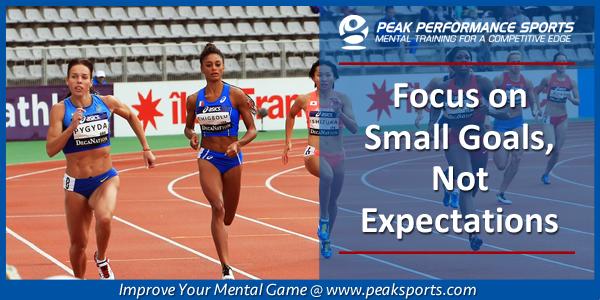Focus on Small Goals, Not Outcome Expectations
Do you find you become more and more frustrated by missing your athletic goal?
Does it feel like each performance that you fall short of your goal seems like failure?
Every athlete has a goal. In fact, athletes are constantly told of the importance of goals for achieving success.
But for many athletes, each missed attempt is filled with frustration and discontentment…
These athletes often question their ability and worth as athletes when they fall short of their goals…
The reason for such a negative reaction is that these athletes are solely focused on results.
Maybe, you are saying to yourself, “Of course I am focused on results… that is what sports are all about.”
While the importance of having a goal cannot be overstated, the key to goal attainment is to focus on the process of achieving your goal. This is called goal getting.
Focusing on the process is like a trial-and-error approach. Every competition provides some feedback that is beneficial in the pursuit of your ultimate goal.
Focusing on the process allows you to make adjustments to your training, technique and your mental approach to competition while sustaining your motivation.
Focusing on the process helps you learn faster, moves you closer to your goals and fosters mental toughness by increasing your ability to work through adversity.
Jennifer Meech is a great example of the power of having a present moment focus. Meech is a senior sprinter on the Dartmouth College track team.
Meech set a goal of breaking the 30-year-old Dartmouth record in the 400m event (54.45).
Each year, Meech steadily chipped away at the record with best times of 56.15 as a freshman, 55.52 as a sophomore and 55.0 as a junior.
Many athletes who focus too much on results might be discouraged by the past and use the past as evidence that something is not possible in the present.
Meech was able to separate her present race from past performances, focus on the process of improving and be totally immersed in the race in front of her.
The result of Meech focusing on the process was setting a new Dartmouth record at the Ivy League championship with a time of 53.99, almost a half second faster than the previous mark.
MEECH: “I definitely take each event one at a time… Breaking a 30-year-old record in the 400-meter this year was another accomplishment that I’m very proud of, especially since it was something that I’ve worked toward for the past three years.”
The key to setting the Dartmouth record was Meech’s ablity to learn from every race that she ran. Every performance taught Meech how to train smarter, run differently or even provided evidence that she was on the right track.
Feedback only works if you have the proper mindset… the mindset of focusing on the process instead of fretting about reaching goals.
Tip for focusing on the process:
Instead of evaluating your performance in all-or-nothing terms (“I succeeded or I failed”), rate your performance from 1-10. Make sure to rate yourself based on the effort, not the outcome.
Then identify 1-2 smaller goals you can improve in your performances by focusing on small things that help you succeed in competition and improve in practice, such as to kick faster in the pool or focus on your race plan.
Keep in mind that setting smaller goals are not expectations. They help direct your attention to what’s important to your performance.
Check out The Focused Athlete CD program for all my strategies to help you focus at peak levels.
Related Sports Psychology Articles
- Effective Goal Setting for Athletes in the New Year
- Setting the Right Goals for Skating
- Strategies to Set and Achieve Goals
*Subscribe to The Sports Psychology Podcast on iTunes
*Subscribe to The Sports Psychology Podcast on Spotify
Download a free sports psychology report to improve your mental game!
Learn more about our one-on-one mental game coaching.
The Confident Athlete

“The Confident Athlete” consists of 2 audio programs that include 14 days of confidence fueling exercises and a simple to follow workbook that guides you through the 14 days, helps you apply the strategies, and customizes the exercises to your personal needs.
Let me help you put a stop to the confidence leak. You can learn to have greater levels of confidence in competition than you do in practice by identifying the specific ways you undermine your own confidence and how to convert your practice confidence into COMPETITIVE CONFIDENCE.
“The Confident Athlete” is a ground-breaking system to teach you how to think like a champion and have ultimate self-confidence every time you step on the playing field, court, track, or course. The confident athletes was developed for any athlete – junior to professional –that wants to gain confidence. However, coaches and sports parents can learn how to teach others to perform with ultimate confidence. Use my program if you want to bust a slump or just wanting higher or more consistent levels of self-confidence.

